Interview: Shana Donahue on Food Justice and Her Journey from UDC to FoodCorps
In memory of a beloved member of the FoodCorps community.
In memory of a beloved member of the FoodCorps community.
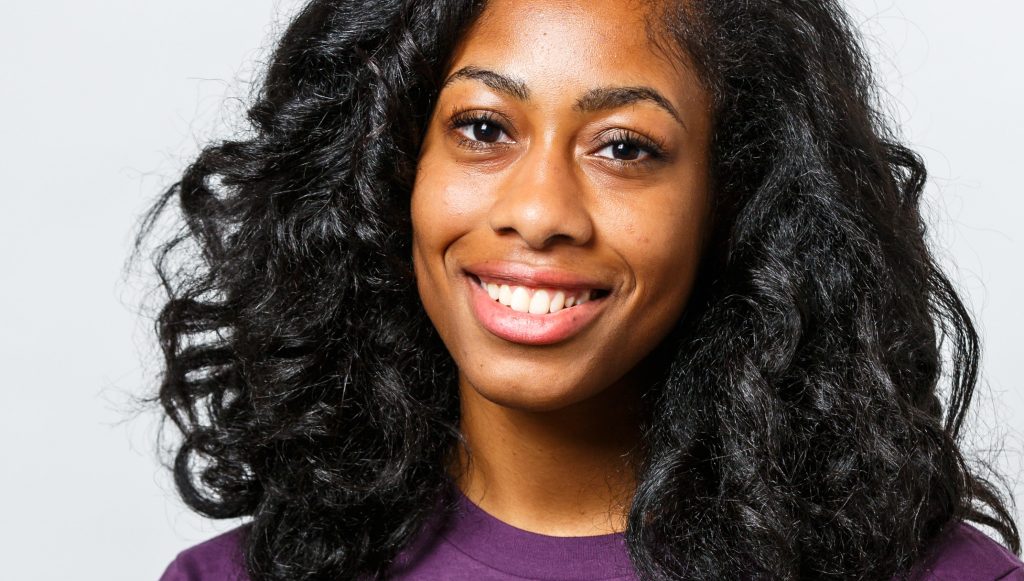
Updated June 2, 2020: Late last week, FoodCorps learned that Shana Donahue passed away at the age of 26. We mourn the loss of a dedicated, compassionate food educator and a beloved member of the FoodCorps alumni community. Our thoughts are with Shana’s loved ones. To learn more about the legacy she leaves, we encourage you to read the remembrance posted by her employer, FreshFarm. FoodCorps staffers and alumni share their own remembrances below.
“Much like the passion and enthusiasm captured in this interview, Shana’s work to support D.C. schools, kids, and communities will continue to ripple out and inspire others. We honor her and miss her in many ways: as one of 65 FoodCorps service members who have served in the D.C. Metro area, as a native Washingtonian committed to uplifting her community, as a Black woman and a food educator whose gifts and talents are gone too soon. D.C. has long been a city that remembers through monuments and murals, though far too few of them commemorate people who looked like Shana and served the city in the way that she did. If you’ve found yourself reading this, consider this an invitation to honor Shana’s life through service, whether it’s going to a garden work day at your neighborhood school or supporting Black farmers and educators on their journey. May we hold Shana’s story close and celebrate her life through our actions.” —Carina Gervacio, D.C. Metro Area Program Director
“Serving alongside Shana as a FoodCorps service member in D.C., I came to know her as a deeply passionate, warm-hearted and generous woman with big dreams for her future that were always at the forefront; what always struck me about Shana was how these dreams were so firmly rooted in service to others and to her community. Shana knew herself and what she wanted to give her community, and she was focused in pursuit of the skills and knowledge and experience she needed to give back to her community in the way she wanted. I remember the way Shana treated everyone as a friend, taking a real interest in those around her to make them feel welcome; she was one of those people that just felt easy and warm to be around. I hope that those of us who were fortunate enough to know Shana and were inspired by her generous and humble spirit, and those who come to know her through story, will carry her spirit forward and continue the work to make the change she wanted to see in her community and in the world.” —Stella Doughty, Grant Partnerships Manager & FoodCorps Alum
My name is Mark Bowen and I am a recruiter with FoodCorps. We’re in the midst of our application period, which means that you can apply to become a service member from now through March 31st. In order for potential service members to better understand what day to day life is like in schools teaching kids about healthy food, I sat down with current service member Shana Donahue.
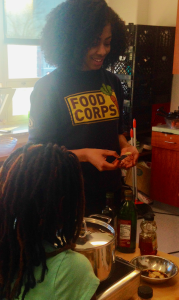 Shana serves with FRESHFARM Markets, conducting food education classes in classrooms and gardens during and after school hours at Ludlow-Taylor Elementary School in Northeast Washington, D.C. She has a cool demeanor and is always smiling, but it is obvious she takes her work with her students seriously – making sure students are engaged in healthy and safe practices every step of the way.
Shana serves with FRESHFARM Markets, conducting food education classes in classrooms and gardens during and after school hours at Ludlow-Taylor Elementary School in Northeast Washington, D.C. She has a cool demeanor and is always smiling, but it is obvious she takes her work with her students seriously – making sure students are engaged in healthy and safe practices every step of the way.
There are six fifth grade students* in her afterschool class today. Jakaya explains, “We are making carrot salad. We are adding our own seasonings and condiments, which will be our dressing. At the end, we will taste each of the salads we made, and then whoever has the most votes in the end will win.” As Jakaya explains the activity, there are whisks twirling in bowls, carrots being grated, sweet and sour smells in the air, and a lot of excitement.
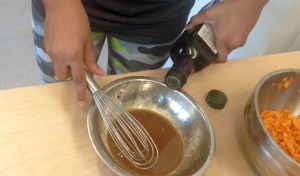 I ask the young ladies what else they have made in the class. Amaya explains, “We have made potato salad, cornbread, pizza, and apple-beet salad.” Each student votes on their favorite dish they have prepared so far: two for cornbread, one for apple-beet salad, and one for butternut squash soup. Many of the ingredients used in their meals are grown in the garden at Ludlow-Taylor.
I ask the young ladies what else they have made in the class. Amaya explains, “We have made potato salad, cornbread, pizza, and apple-beet salad.” Each student votes on their favorite dish they have prepared so far: two for cornbread, one for apple-beet salad, and one for butternut squash soup. Many of the ingredients used in their meals are grown in the garden at Ludlow-Taylor.
In the end, there were no definitive winners of whose carrot salad was the best. All the participants agreed that each salad had such a unique taste that they were all winners.
I interviewed Shana Donahue about her FoodCorps experience, and here’s what she had to say:
“I always want to put the best things in me so I can be the best. And I want children, and people in general, to have the information to know what to put in them so they can be their best.”
At the University of the District of Columbia (UDC), I am a member of MANRRS (Minorities in Agriculture, Natural Resources and Related Sciences). I did not go to the [MANNRS] conference in Houston but my advisor did. She connected with a recruiter from FoodCorps, and explained the opportunity to me.
A lot of my family has experienced several diet related diseases and I’ve always had an interest in nutrition, which is my major – nutrition and dietetics. I felt being able to be in schools, teach children nutrition education, and teach children things that I was not taught when I was in school was a rewarding opportunity. Also, I felt the experience would be awesome, and it has been awesome!
My days vary. There are usually no FoodPrints classes on Mondays and Fridays. Those days are more gardening (when it’s in season), planning, emails, lesson planning for my after school classes and coordinating meetings like the Wellness Committee here at Ludlow-Taylor.
Tuesdays, Wednesdays, and Thursdays I co-teach FoodPrints classes with Martine Hippolyte, one of my amazing site supervisors. Those days are usually a little more hectic because we usually have two classes each day, one in the morning and one in the afternoon, and vary from one hour for pre kindergarten and two hours for older students. Between classes I prepare for other classes. That may be washing and preparing vegetables, and dependent on the grade level, there may be more preparation that needs to be done. For example, the pre-k and kindergarten classes may need more prep on the front end. After each class there is a lot of cleaning to do!
I think it was today! When Kiara’s mother exclaimed, “I can’t believe you got Kiara to eat carrots! Kiara never eats carrots at home. And look, she loves them!” I never knew Kiara didn’t eat carrots because she always eats everything that we prepare. So that was a big moment for me – actually seeing the effect my service is having on the kids. That’s the reward.
Definitely. One of the main pillars in FoodCorps is access. When it comes to access, you can see the disparities between different groups. Whether due to income, social status, ethnic background, or where someone lives geographically, you can see a difference in the quality of food and availability of local food within those institutions. Being able to link children who may not come across it often otherwise to healthy food is a service worth doing to me.
Nutrition is a big part of my values. I always want to put the best things in me so I can be the best. And I want children, and people in general to have that information to know what to put in them so they can be their best.
Food is universal. No matter who you are, food is important. We all need to eat and we all need healthy nutritious food. But when it comes to African Americans, there are a lot of stigmas around growing food, becoming one with food and knowing where it comes from. I think that should change.
When I told my family what I wanted to study and that I had future aspirations of becoming a farmer one day, they didn’t take it seriously. When I graduate, I will be a first-generation college graduate. My family looks at the career path I have chosen and ask, “Why do you want to study nutrition and be a farmer of all things?” Many African Americans view growing food and agriculture as moving backward, not forward, but I beg to differ. Agriculture is one of the most important industries in the world. I always wanted to do something to help people. I thought I wanted to become a teacher, but then I really got into nutrition. Giving people nutrition and gardening education is still helping people. Regardless of age, color, or location, it’s information that they need. It’s important for whomever you are and wherever you are to know why food is really important.
As far as next steps, I plan on finishing school at UDC. Long term, I want to go to grad school, possibly in public health. I also want to become a registered dietician, and continue working in underserved communities by providing nutrition education, gardening education and continue advocating for sustainable healthy local food. Oh, and I want to start a farm!
*Students’ names have been changed to protect their identities.
This interview is cross-posted with the UDC CAUSES blog.
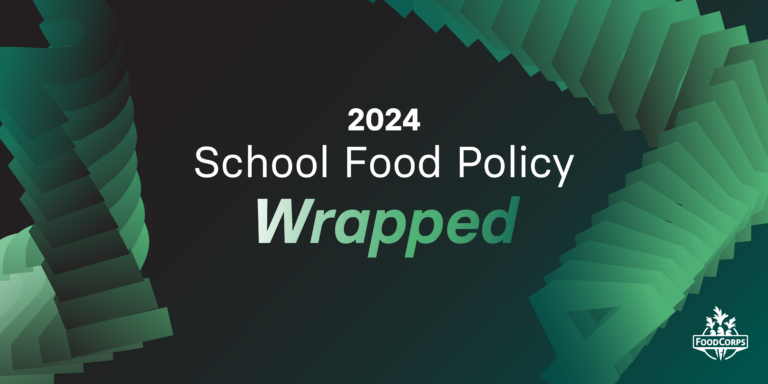
Our 2024 Child Nutrition Policy Year in Review
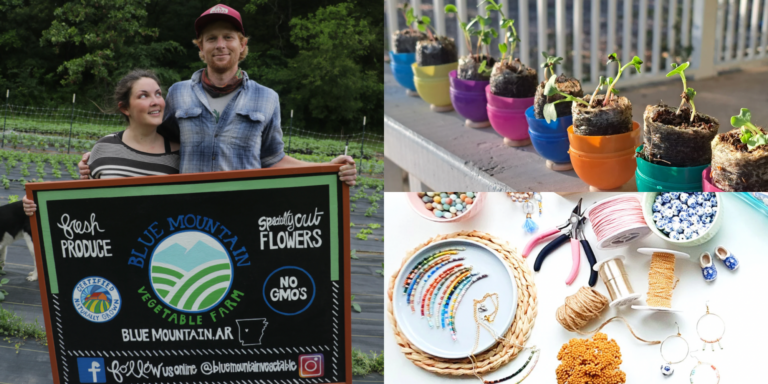
9 Thoughtful Holiday Gifts Made by FoodCorps Alumni

The Policy Brief, Fall 2024: After the Election